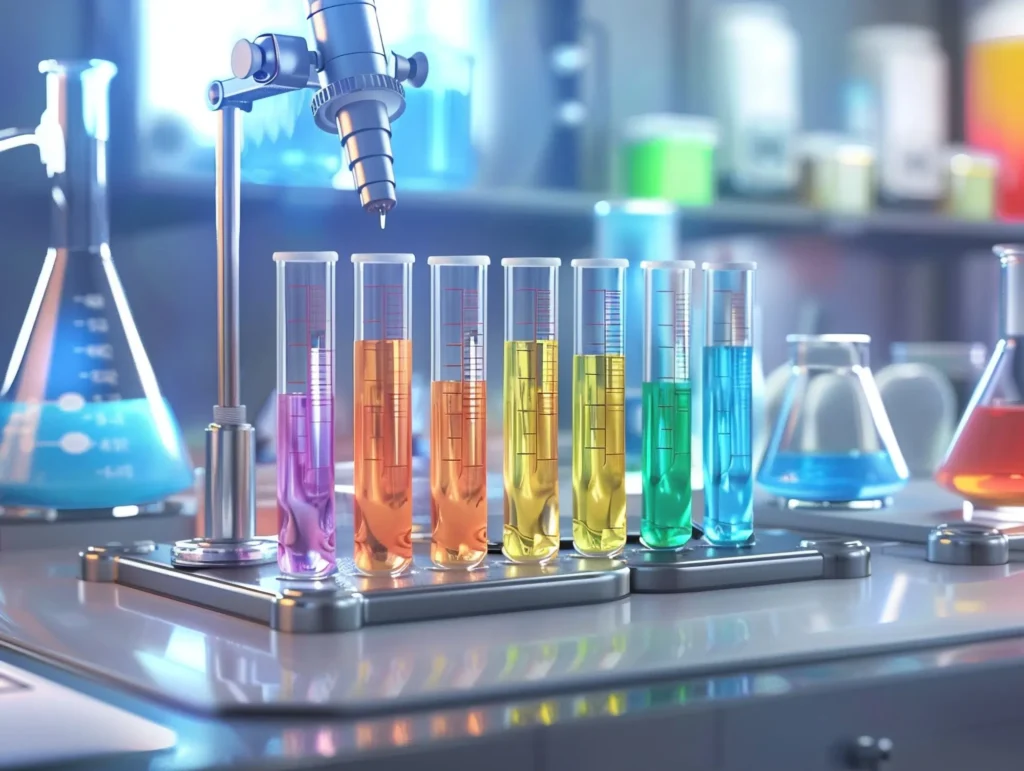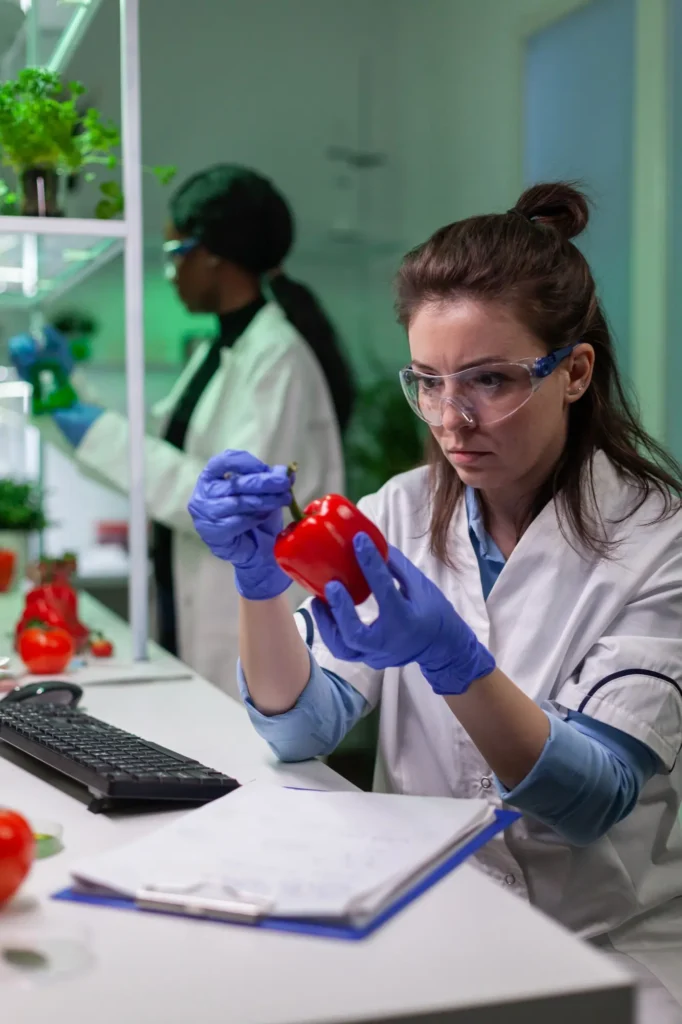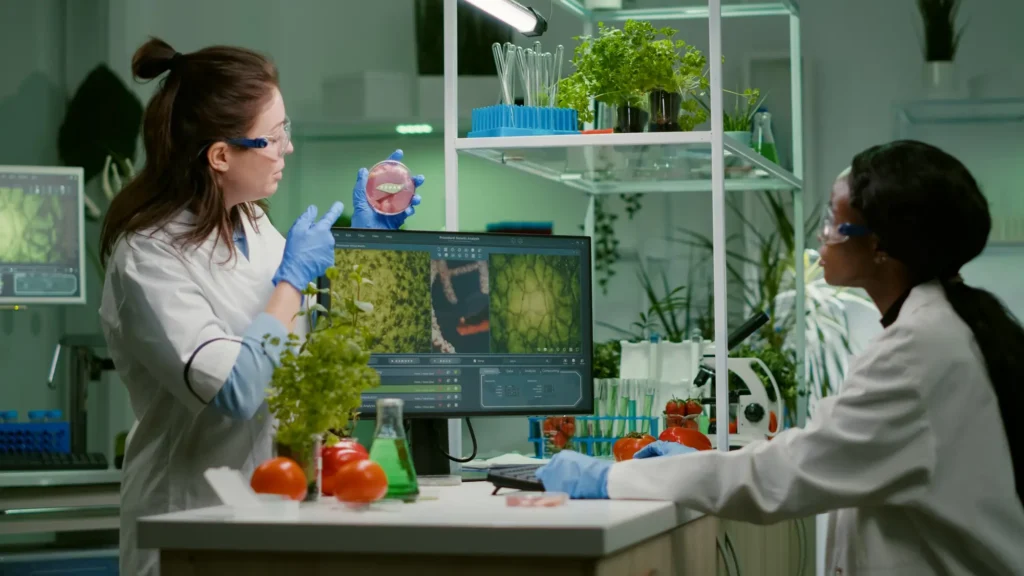Chemistry is the scientific study of the properties, composition, and behavior of matter. As a branch of natural science, it focuses on elements that make up matter and the compounds formed from atoms, molecules, and ions. Chemistry examines their structure, properties, and the various reactions they undergo. The influence of chemistry extends far beyond the laboratory, profoundly affecting many aspects of our everyday lives, from the food we eat to the medicines we take.
This article explores the importance of chemistry in everyday life, covering its uses, applications, and the profound ways it affects our daily routines.
Table of Contents
What is Chemistry?
Chemistry sits at the crossroads between physics and biology, bridging the gap between these two disciplines. Often referred to as the “central science,” chemistry provides a foundational framework that helps us understand both basic and applied scientific principles. For example, chemistry explains:

- The chemistry of plants (botany) and how they convert sunlight into energy through photosynthesis.
- The formation and classification of igneous rocks (geology).
- The processes behind the creation of atmospheric ozone and the degradation of environmental pollutants (ecology).
- The properties and formation of lunar soil (cosmochemistry).
- The mechanisms of how medications work in the body (pharmacology).
- The techniques used to collect and analyze DNA evidence at crime scenes are called forensics.
Chemistry is the science that deals with the study of matter and its interactions with other matter and energy. It not only investigates the properties of substances but also explores how and why these substances change under different conditions.
How Chemistry is Important in Everyday Life
Chemistry is akin to an unseen wizard, quietly working behind the scenes to influence almost everything around us. It is present in the air we breathe, which is a complex mixture of gases like oxygen and carbon dioxide that are vital for human survival and plant photosynthesis, respectively. Every time we prepare food, chemistry is at play, altering the taste, texture, and appearance of raw ingredients to create delicious dishes.
Chemistry is also involved in various fields, including food, medicines, cosmetics, green chemistry, soaps and detergents, textiles, building and construction, fuels, batteries, agriculture, and even wars. Let’s explore the significance of chemistry in each of these areas in detail.
Importance of Chemistry in Food
Chemistry plays a crucial role in the production, preservation, and enhancement of food. All food substances are composed of chemical compounds, including carbohydrates, proteins, fats, vitamins, and minerals, which are essential for human nutrition and health. Chemistry helps us understand how these compounds interact during cooking and processing, affecting flavor, texture, and nutritional value.

Food Preservation and Additives
Chemicals are also used extensively in food preservation to extend shelf life and maintain quality. Preservatives such as sodium benzoate and potassium sorbate inhibit microbial growth, while antioxidants like ascorbic acid (vitamin C) prevent oxidation and spoilage. Flavorings, colorings, and emulsifiers enhance taste and appearance, making food more appealing.
Chemistry has provided essential fertilizers like urea, calcium superphosphates, and ammonium sulfate to boost agricultural productivity, ensuring a stable supply of nutritious crops, fruits, and vegetables. In this way, chemistry contributes to global food security.
Importance of Chemistry in Medicines
Chemistry is at the heart of pharmaceutical science, where it plays a pivotal role in the development of drugs and treatments. Medicines are chemical substances designed to prevent, diagnose, and treat diseases, thereby improving health and extending life.

Key Pharmaceuticals and Their Roles
- Analgesics: These are pain-relieving drugs, such as aspirin and ibuprofen, used to alleviate pain from various conditions.
- Tranquilizers: Medications like diazepam are used to treat mental health conditions such as anxiety and tension.
- Antiseptics: Substances like chlorhexidine are applied to the skin or wounds to prevent infection by killing or inhibiting the growth of microorganisms.
- Disinfectants: Chemicals such as bleach are used to sterilize surfaces by destroying harmful microorganisms.
- Antibiotics: These are chemical substances, such as penicillin and tetracycline, produced by certain microorganisms to kill or inhibit the growth of harmful bacteria.
- Antacids: Compounds like magnesium hydroxide are used to neutralize excess stomach acid, relieving indigestion and heartburn.
Chemistry not only helps in the synthesis and formulation of these drugs but also in understanding their mechanisms of action, side effects, and interactions with other medications.
Importance of Chemistry in Cosmetics
In daily life, we use a variety of cosmetic products, such as lotions, perfumes, talcum powder, and makeup. All these products are developed using chemical compounds that are designed to be safe for the skin and enhance beauty.

Cosmetic Chemistry and Skin Care
Chemists develop moisturizers and emollients that help retain skin moisture, sunscreens that protect against harmful UV radiation, and antioxidants like vitamin E that combat skin aging. Fragrances are also crafted through complex chemical processes to produce long-lasting and pleasant scents. The role of chemistry in cosmetics extends to maintaining the pH balance of the skin, ensuring products are both effective and safe for use.
Importance of Green Chemistry
Green chemistry is a branch of chemistry focused on designing products and processes that minimize the use and generation of hazardous substances. It contributes to environmental protection by developing sustainable and eco-friendly solutions.
Environmental Benefits of Green Chemistry
Green chemistry promotes the use of non-toxic, renewable resources and seeks to reduce waste and energy consumption. For instance, the replacement of chlorofluorocarbons (CFCs) in refrigerators with more environmentally friendly refrigerants helps reduce ozone depletion. Additionally, green chemistry innovations have led to the development of biodegradable plastics and non-toxic cleaning products, contributing to a cleaner environment and healthier ecosystems.
Importance of Chemistry in Soaps and Detergents


Soaps and detergents are essential for cleaning and hygiene. Chemically, soaps are the sodium or potassium salts of fatty acids, such as stearic acid and oleic acid, while detergents are synthetic compounds designed to perform similar functions in both soft and hard water.
The Chemistry Behind Cleaning
The saponification process is a chemical reaction that produces soap from fats and an alkali. Detergents, on the other hand, are made using sulfonation and sulfation reactions, resulting in substances that can break down grease and oil, suspending dirt particles in water for easy removal. The development and production of these cleaning agents rely heavily on chemical processes to ensure they are effective, safe, and environmentally friendly.
Importance of Chemistry in Textiles
The textile industry relies on chemistry to transform raw materials into finished products. Natural fibers like wool, silk, cotton, and jute, and synthetic fibers such as polyester, nylon, and acrylic undergo various chemical treatments to enhance their properties.


Chemical Processes in Textile Production
Textiles are treated with chemicals for bleaching, dyeing, scouring, and finishing to improve their appearance, texture, and durability. Chemical finishes can impart desirable qualities, such as water resistance, flame retardancy, and wrinkle resistance, enhancing the functionality and value of textile products.
Importance of Chemistry in Building and Construction
Chemistry plays a critical role in the construction industry, providing materials that enhance durability, safety, and energy efficiency. Bricks, cement, polymers, and other construction materials are formulated through chemical processes.

Enhancing Construction Materials
Cement, a fundamental construction material, is produced through the chemical reaction of limestone and clay at high temperatures. Polymers like polyvinyl chloride (PVC) are used to make pipes and fittings that are resistant to corrosion and chemical damage. Additionally, insulating materials like fiberglass and polystyrene are chemically designed to improve energy efficiency in buildings by reducing heat transfer.
Importance of Chemistry in Fuel
Fuels such as petrol, diesel, natural gas, and biofuels are integral to modern transportation and energy production. Chemistry is essential in understanding the extraction, refining, and efficient use of these fuels.

Petrochemistry and Energy Production
Petrochemistry focuses on the transformation of crude oil and natural gas into useful products through processes like cracking and distillation. Chemistry also aids in developing alternative fuels and energy sources, such as hydrogen fuel cells and electric batteries, which are more sustainable and have a lower environmental impact.
Importance of Chemistry in Battery Technology
Batteries power countless devices in our daily lives, from smartphones and laptops to electric vehicles. The functioning of batteries is governed by the principles of electrochemistry, where chemical reactions generate electrical energy.

Advancements in Battery Chemistry
Lithium-ion batteries, known for their high energy density and long cycle life, have revolutionized portable electronics and electric vehicles. Research in battery chemistry focuses on developing new materials
and electrolytes to improve efficiency, reduce costs, and enhance safety. Solid-state batteries and sodium-ion batteries are examples of emerging technologies that promise to advance energy storage capabilities.
Importance of Chemistry in Agriculture
Chemistry is fundamental to modern agriculture, enhancing crop production and sustainability while minimizing environmental impact. It allows for the development of fertilizers, pesticides, and herbicides that optimize crop yield and quality.

Chemical Solutions in Farming
Fertilizers, such as nitrate-based and phosphate-based compounds, provide essential nutrients that promote plant growth. Pesticides and herbicides protect crops from pests and weeds, reducing crop loss and ensuring a stable food supply. Additionally, chemistry aids in soil analysis and nutrient management, promoting sustainable farming practices that conserve resources and protect ecosystems.
Importance of Chemistry in Wars
Chemistry has played a significant role in the development of explosives and chemical weapons used in warfare. Substances like TNT (trinitrotoluene), RDX (Research Department Explosive), and HMX (High Melting Explosive) are powerful explosives that have been utilized in military applications.
The Chemical Science of Warfare
The development of nuclear weapons also involves complex chemical processes, particularly in the enrichment and handling of uranium and plutonium. Chemistry has been instrumental in both the creation and disarmament of these weapons, highlighting its dual role in enhancing and mitigating conflict.
Here is an informative table summarizing the key points from the article on the importance of chemistry in everyday life:
| Field | Importance of Chemistry | Examples |
|---|---|---|
| Food | Chemistry is crucial for food preservation, enhancement, and safety. It helps understand the interaction of chemical compounds like carbohydrates, proteins, fats, and vitamins in food. | Preservatives (sodium benzoate), antioxidants (ascorbic acid), fertilizers (urea, calcium superphosphates) |
| Medicines | Chemistry underlies the development, synthesis, and function of medicines. It helps in the formulation of drugs and understanding their effects on the human body. | Analgesics (aspirin), antibiotics (penicillin), antacids (magnesium hydroxide), antiseptics (chlorhexidine) |
| Cosmetics | Chemistry helps formulate safe and effective cosmetic products. It ensures that skincare and beauty products maintain the pH balance of the skin and include beneficial compounds. | Moisturizers, sunscreens, antioxidants (vitamin E), fragrances |
| Green Chemistry | Green chemistry focuses on creating sustainable, eco-friendly products and processes to minimize environmental harm. It promotes the use of non-toxic materials and reduces waste. | Biodegradable plastics, replacement of CFCs in refrigerators, non-toxic cleaning products |
| Soaps and Detergents | Chemistry is essential for producing soaps and detergents through processes like saponification. These products are designed to remove dirt, grease, and oils effectively. | The saponification process, sulfonation, and sulfation reactions |
| Textiles | Chemistry is used in the processing of natural and synthetic fibers to improve their properties. Chemical treatments enhance the appearance, texture, and durability of textile products. | Bleaching, dyeing, scouring, finishing |
| Building and Construction | Chemistry contributes to the quality and safety of construction materials. It helps in the formulation of durable and heat-resistant materials for buildings. | Cement production, polymers (PVC for pipes), insulating materials (fiberglass, polystyrene) |
| Fuel | Chemistry is vital for understanding and refining fuels. It aids in the development of sustainable energy sources and efficient fuel use. | Petrochemistry, hydrogen fuel cells, electric batteries |
| Batteries | Chemistry enables the development of batteries that store and convert chemical energy into electrical energy, powering various devices and vehicles. | Lithium-ion batteries, solid-state batteries, sodium-ion batteries |
| Agriculture | Chemistry enhances agricultural productivity and sustainability by developing fertilizers, pesticides, and herbicides. It also aids in soil health optimization and sustainable farming practices. | Fertilizers (nitrate-based, phosphate-based), pesticides, herbicides |
| Wars | Chemistry has played a role in the development of explosives and chemical weapons. It is involved in both the creation and disarmament of these substances, highlighting its dual role in warfare. | Explosives (TNT, RDX, HMX), nuclear weapons (uranium, plutonium) |
This table summarizes how chemistry impacts various fields by detailing its importance, contributions, and specific examples.
Conclusion
Chemistry is a vital science that permeates every aspect of our daily lives. From the food we eat to the medicines we use, from the clothes we wear to the homes we live in, chemistry provides the tools and knowledge to improve our quality of life, enhance safety, and ensure sustainability. Its role in advancing technology, protecting the environment, and fostering innovation underscores the importance of chemistry in shaping a better future for all. Whether through the development of new materials, medicines, or energy sources, chemistry will continue to be an essential science that drives progress and enhances human life in countless ways.
Related Articles
- Understanding Matter: States, Properties, and Beyond
- Properties of Matter: An In-Depth Exploration
- Understanding Measurement Uncertainty in Chemistry with a Perfect Explanation
- Laws of Chemical Combination: The Foundations of Chemical Reactions
- Dalton’s Atomic Theory: An Interesting Groundbreaking Scientific Concept
- Gram Atomic Mass and Gram Molecular Mass: A Comprehensive Guide
- Understanding the Mole Concept: A Comprehensive Guide
- Comprehensive Guide to Percentage Composition in Chemistry
- Comprehensive Guide to Stoichiometry: Concepts, Calculations, & Real-Life Applications
- The Fascinating Composition of an Atom: Exploring the Building Blocks of Matter
Frequently Asked Questions (FAQs)
What is Chemistry and why is it considered the “central science”?
Chemistry is the scientific study of the properties, composition, and behavior of matter. It bridges the gap between physics and biology, making it fundamental to understanding the natural world. Often referred to as the “central science,” chemistry connects and integrates biological sciences (like biology and medicine) with physical sciences (like physics and geology). This is because many scientific disciplines rely on chemical principles to explain their phenomena, from the metabolic pathways in living organisms to the formation of rocks and minerals.
How does Chemistry impact the food we eat?
Chemistry plays a crucial role in the food industry by explaining how chemical compounds like carbohydrates, proteins, fats, and vitamins interact during cooking and preservation. For instance, when we cook food, chemical reactions such as the Maillard reaction (responsible for browning and flavor development) or caramelization (browning of sugars) enhance the taste and texture. Preservatives and antioxidants are added to foods to prevent spoilage and extend shelf life, while emulsifiers help maintain texture in products like salad dressings.
What role does Chemistry play in Medicine?
Chemistry is fundamental in the development and effectiveness of medicines. It allows for the design and synthesis of pharmaceutical compounds that treat diseases and alleviate symptoms. Analgesics like ibuprofen reduce pain by blocking prostaglandins, antibiotics like penicillin kill bacteria by interfering with their cell wall synthesis, and antacids neutralize excess stomach acid to relieve indigestion. The understanding of chemical interactions at the molecular level enables the development of new drugs and therapies.
How do Cosmetic Products utilize Chemistry?
Chemistry is essential in formulating cosmetic products that are safe and effective for skin and hair care. Ingredients such as emollients, humectants, and occlusives in moisturizers help maintain skin hydration, while sunscreens contain chemical or mineral filters that protect against UV radiation. Fragrances are composed of a mixture of aromatic compounds that provide pleasant scents, and antioxidants like vitamin C and E are added to creams to protect against environmental damage.
What is Green Chemistry, and why is it important?
Green Chemistry is a field of chemistry focused on designing products and processes that minimize environmental impact and reduce the use of hazardous substances. It promotes sustainability by encouraging the development of safer chemicals, reducing waste, and conserving energy. For example, green solvents like water or supercritical CO2 are used instead of toxic solvents in manufacturing, and catalytic reactions that reduce energy consumption are preferred. Green chemistry helps prevent pollution and promotes safer consumer products.
How do Soaps and Detergents work, chemically speaking?
Soaps and detergents function as cleaning agents through their amphiphilic structure, meaning they have both hydrophobic (water-repelling) and hydrophilic (water-attracting) parts. When used in water, the hydrophobic tails of soap molecules bind with grease and dirt, while the hydrophilic heads remain in the water. This action forms micelles, which trap oils and dirt, allowing them to be rinsed away. Detergents are similar but are often more effective in hard water due to their synthetic surfactants.
Why is Chemistry important in the Textile Industry?
In the textile industry, chemistry is vital for processing fibers and fabrics. It involves using chemical treatments to clean, dye, and finish textiles. For example, bleaching uses chemicals like hydrogen peroxide to whiten fabrics, while dyeing involves chemical reactions that bond dyes to fabric fibers. Finishing processes add properties such as water repellency, wrinkle resistance, and flame retardance, enhancing the functionality and appeal of textile products.
How does Chemistry contribute to Building and Construction?
Chemistry is crucial in developing materials used in building and construction. Cement and concrete, for example, rely on chemical reactions for strength and durability. The hydration reaction of cement with water forms calcium silicate hydrate, providing structural integrity. Polymers like PVC are used for pipes due to their flexibility and resistance to corrosion, and insulating materials like fiberglass and polystyrene are designed to maintain energy efficiency in buildings.
What is the role of Chemistry in Fuel Production?
Chemistry plays a key role in the production and refinement of fuels. Petrochemistry involves the chemical processing of crude oil into fuels like gasoline, diesel, and jet fuel. This includes distillation and cracking processes that break down complex hydrocarbons into simpler ones. Chemistry also contributes to the development of alternative fuels, such as biofuels, by converting biological materials into usable energy sources, thereby reducing reliance on fossil fuels.
How do Batteries rely on Chemistry to generate electricity?
Batteries operate based on electrochemical reactions that convert chemical energy into electrical energy. Within a battery, a redox reaction occurs where one material (the anode) undergoes oxidation (loses electrons), and another (the cathode) undergoes reduction (gains electrons). This flow of electrons through an external circuit generates electricity. Lithium-ion batteries, for instance, rely on the movement of lithium ions between electrodes to store and release energy, powering a wide range of electronic devices.
How does Chemistry enhance Agricultural Practices?
Chemistry enhances agricultural productivity by providing tools to optimize soil health and protect crops. Fertilizers supply essential nutrients like nitrogen, phosphorus, and potassium to the soil, promoting plant growth. Pesticides and herbicides protect crops from pests and weeds by targeting specific biological pathways, minimizing crop loss. Advanced soil chemistry techniques analyze nutrient levels to customize fertilizer application, ensuring sustainable and efficient farming practices.
What are the chemical bases for Explosives used in Wars?
Explosives used in warfare, such as TNT (trinitrotoluene), RDX (Research Department Explosive), and HMX (High Melting Explosive), are composed of high-energy chemical compounds that release a large amount of energy upon detonation. These compounds undergo rapid decomposition reactions that produce gases at high temperatures and pressures, resulting in an explosion. The chemistry of explosives involves understanding molecular stability and energetic bonds to control their detonation characteristics.
How does Chemistry contribute to Environmental Protection?
Chemistry contributes to environmental protection by developing methods to reduce pollution and manage waste. Catalytic converters in cars reduce harmful emissions by converting toxic gases like carbon monoxide and nitrogen oxides into less harmful substances. Water treatment involves chemical processes like flocculation, precipitation, and filtration to remove contaminants. Green chemistry aims to design chemical processes that minimize waste and use safer materials, promoting sustainable practices.
What is the role of Chemistry in understanding and mitigating Climate Change?
Chemistry helps understand and mitigate climate change by studying the behavior of greenhouse gases like carbon dioxide (CO2) and methane (CH4) in the atmosphere. Atmospheric chemistry examines how these gases trap heat and contribute to global warming. Chemists are developing technologies for carbon capture and storage (CCS) and creating renewable energy sources to reduce reliance on fossil fuels, thus decreasing greenhouse gas emissions and their impact on the climate.
How are Polymers created and what are their uses?
Polymers are large molecules made by joining many smaller units called monomers through polymerization reactions. Polymers can be natural, like cellulose and proteins, or synthetic, like polyethylene and nylon. They have diverse uses due to their versatility and properties. Plastic polymers are used in packaging, elastomers like rubber are used in tires, and biopolymers are being developed for biodegradable applications, reducing environmental impact.
What are Alloys, and why are they important in everyday life?
Alloys are mixtures of two or more metals, or a metal and another element, designed to enhance properties like strength, corrosion resistance, and ductility. For example, steel is an alloy of iron and carbon that is much stronger and more durable than pure iron. Brass (an alloy of copper and zinc) is used in
musical instruments and fittings due to its workability and corrosion resistance. Alloys are essential in the construction, automotive, and aerospace industries for their superior properties.
How does Chemistry help in water purification?
Chemistry plays a crucial role in water purification by employing various chemical processes to remove impurities. Coagulation and flocculation use chemicals like alum to aggregate suspended particles, making them easier to filter out. Disinfection processes, such as chlorination or ozonation, kill harmful microorganisms, ensuring safe drinking water. Ion exchange resins remove harmful ions like lead and cadmium, and activated carbon is used to adsorb organic pollutants and toxins.
What is Biochemistry, and how does it differ from general Chemistry?
Biochemistry is a branch of chemistry that focuses on the chemical processes and substances occurring within living organisms. It studies the structure and function of biomolecules such as proteins, nucleic acids, lipids, and carbohydrates, which are essential for life. Unlike general chemistry, which covers a broad range of substances and reactions, biochemistry is specifically concerned with biological systems and how chemical reactions underlie processes like metabolism, DNA replication, and cell signaling.
How do Chemical Reactions in the body relate to everyday Health?
Chemical reactions in the body, known as metabolic reactions, are crucial for maintaining health and supporting life functions. Enzymes, which are biological catalysts, speed up these reactions, ensuring processes like digestion, energy production, and detoxification occur efficiently. For example, the breakdown of glucose during cellular respiration provides energy for bodily functions. Understanding these reactions helps in diagnosing diseases, developing treatments, and maintaining overall health through nutrition and medicine.
How does Chemistry contribute to Nanotechnology?
Chemistry is fundamental to nanotechnology, which involves manipulating matter on an atomic or molecular scale to create new materials with unique properties. Nanomaterials, such as carbon nanotubes and quantum dots, are engineered using chemical processes to have enhanced electrical, optical, or mechanical properties. These materials are used in various applications, from drug delivery systems in medicine to solar cells in renewable energy. Chemistry enables the precise control of material composition and properties at the nanoscale, driving innovation in this cutting-edge field.
Read More Articles
- Kingdom Animalia: Definition, Classification, And Characteristics
- The Deuteromycetes: A Comprehensive Study Of Imperfect Fungi
- Basidiomycetes: A Comprehensive Study Of Club Fungi
- Ascomycetes – A Detailed Exploration Of Characteristics, Reproduction, And Importance
- Phycomycetes: A Detailed Exploration Of The Lower Fungi
- Kingdom Fungi: A Comprehensive Exploration
- Protozoans: Structure, Classification, Characteristics, And Examples
- Slime Moulds: A Comprehensive Overview
- Euglenoid: The Unique Plant-Animal Hybrid
- Dinoflagellates: The Whirling Protists of the Oceans
- Chrysophytes: A Detailed Exploration Of Their Classification, Characteristics, & Significance
- Eubacteria: Structure, Characteristics, Classification, And Types
- Archaebacteria: A Glimpse Into Ancient Life Forms
- Kingdom Protista: A Diverse Group Of Single-Celled Eukaryotes
- The Diversity And Importance Of Bacteria: Archaebacteria And Eubacteria
- Kingdom Monera: The World Of Bacteria
- The Evolution Of Biological Classification Systems
- Understanding Taxonomy, Taxonomic Categories And Hierarchy
- The Diversity Of Life: Understanding Taxonomy, Classification, And Systematics

